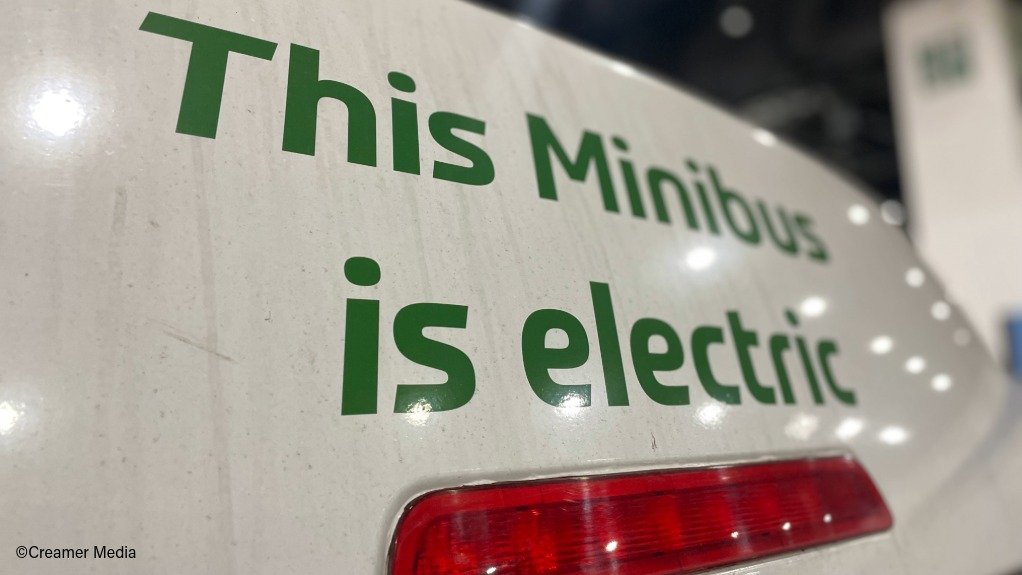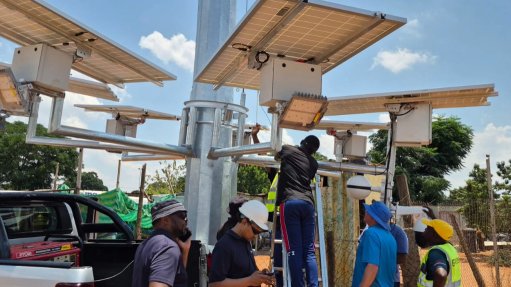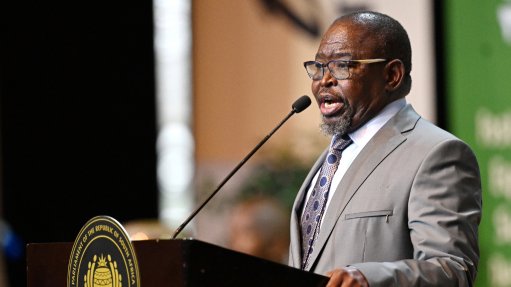South Africa’s coal-heavy grid not a barrier to EV adoption, C40 Cities says
The argument that South Africa’s coal-heavy electricity grid makes the adoption of electric vehicles (EVs) premature has been dismissed by C40 Cities (South Africa) senior programme manager for Africa Prian Reddy.
Speaking at the Smarter Mobility Africa conference, in Sandton, on October 2, he said that such claims were misguided and that the introduction of electric mobility and the decarbonisation of the grid needed to proceed in parallel.
“Often, people argue that because the grid is still coal-based, we shouldn’t adopt EVs yet. I think that’s a false argument,” he said, adding that mechanisms such as energy wheeling and the growth of renewable capacity would provide fleet operators with access to clean electricity over time.
Reddy emphasised that the first step was deployment. Cities and private operators were already investing in renewable energy at depots and charging hubs, but large-scale operations would require the development of wheeling markets that allow electricity generated in one part of the country to be used elsewhere.
He said that the emergence of virtual wheeling pilots and new city-level policies was an encouraging sign, suggesting that operators of buses, trucks and taxis would soon be able to source renewable energy for their fleets.
Turning to hydrogen, Reddy said that it remained part of the broader zero-emission mobility landscape but argued that its adoption would be constrained by cost. He noted that hydrogen fuel-cell buses were still significantly more expensive than battery-electric alternatives, and until prices declined there would be limited scope for implementation.
Reddy also provided an overview of the state of South Africa’s vehicle population and new energy vehicle sales.
Passenger cars made up the largest segment at about 8-million units, followed by light commercial vehicles at about 2.7-million, trucks at about 400 000 and buses at about 66 000.
From 2020 to 2024, there had been steady growth in sales of traditional hybrid vehicles, while the uptake of battery-electric models was slower.
In 2024, about 1 257 pure battery EVs were sold, with the Volvo EX30 emerging as the top-selling model at 406 units, followed by the BMW iX3 at 221. Most sales occurred in the R2-million to R3-million price bracket, while the most popular battery ranges were between 400 km and 500 km.
He said investment in charging infrastructure had accelerated in recent years, largely driven by the private sector, with between 444 and 500 public charging stations currently available nationwide. These were mostly installed in cities and along major freeways.
Future growth, he suggested, would come from government-led initiatives and public–private partnerships, as municipalities were beginning to introduce policies to stimulate further deployment.
On public transport, Reddy highlighted several milestones. He noted that Cape Town had finalised the procurement of 30 electric low-floor buses for its bus rapid transit (BRT) system, with Volvo awarded the contract and delivery scheduled for 2027.
He said that private operator Golden Arrow Bus Services had already deployed 60 of the 120 BYD electric commuter buses it ordered, supported by the establishment of charging hubs at its depot.
Meanwhile, Reddy said that the City of Tshwane had announced plans to procure 20 electric BRT buses and was working to integrate renewable energy through its small-scale embedded generation policies to support charging.
“A lot of the other cities are looking to these case studies to design their own programmes,” he said.
In KwaZulu-Natal, eThekwini was preparing to procure 19 electric buses for the GO!Durban system and, significantly, had become the first municipality in South Africa to include electric minibus taxis in its official planning, with a pilot project expected in the coming year.
He also noted that the City of Johannesburg was concluding its e-bus prefeasibility study and would later this year issue a global open call for original-equipment manufacturers (OEMs) to demonstrate electric bus technology, ahead of a planned procurement of 134 buses for the Rea Vaya BRT system by 2027.
Reddy also addressed developments in freight and logistics, describing the sector as underappreciated but beginning to show traction.
In 2023, he said that small numbers of electric trucks were sold by OEMs including JAC, Volvo, BYD, Fuso and Scania. Growth continued in 2024 with the entry of Mercedes-Benz through its eActros model.
Reddy noted that heavy-duty trucks typically operated in the R6-million to R7-million price range, while electric light delivery vehicles sold for R1-million to R1.5-million.
He added that official sales statistics did not capture all activity, pointing to Pretoria-based Chinese OEM Everlectric, which reported more than 200 units sold or leased since 2022, largely in the form of panel vans and bakkies. This, he said, suggested that growth was faster than official publications indicated.
Reddy also noted that battery ranges reflected usage patterns, with heavy-duty trucks favouring 500 km or more for long-distance haulage, medium-duty trucks clustered around 250 km to 300 km, and light delivery vehicles at 100 km to 200 km for urban logistics.
Article Enquiry
Email Article
Save Article
Feedback
To advertise email advertising@creamermedia.co.za or click here
Press Office
Announcements
What's On
Subscribe to improve your user experience...
Option 1 (equivalent of R125 a month):
Receive a weekly copy of Creamer Media's Engineering News & Mining Weekly magazine
(print copy for those in South Africa and e-magazine for those outside of South Africa)
Receive daily email newsletters
Access to full search results
Access archive of magazine back copies
Access to Projects in Progress
Access to ONE Research Report of your choice in PDF format
Option 2 (equivalent of R375 a month):
All benefits from Option 1
PLUS
Access to Creamer Media's Research Channel Africa for ALL Research Reports, in PDF format, on various industrial and mining sectors
including Electricity; Water; Energy Transition; Hydrogen; Roads, Rail and Ports; Coal; Gold; Platinum; Battery Metals; etc.
Already a subscriber?
Forgotten your password?
Receive weekly copy of Creamer Media's Engineering News & Mining Weekly magazine (print copy for those in South Africa and e-magazine for those outside of South Africa)
➕
Recieve daily email newsletters
➕
Access to full search results
➕
Access archive of magazine back copies
➕
Access to Projects in Progress
➕
Access to ONE Research Report of your choice in PDF format
RESEARCH CHANNEL AFRICA
R4500 (equivalent of R375 a month)
SUBSCRIBEAll benefits from Option 1
➕
Access to Creamer Media's Research Channel Africa for ALL Research Reports on various industrial and mining sectors, in PDF format, including on:
Electricity
➕
Water
➕
Energy Transition
➕
Hydrogen
➕
Roads, Rail and Ports
➕
Coal
➕
Gold
➕
Platinum
➕
Battery Metals
➕
etc.
Receive all benefits from Option 1 or Option 2 delivered to numerous people at your company
➕
Multiple User names and Passwords for simultaneous log-ins
➕
Intranet integration access to all in your organisation




















